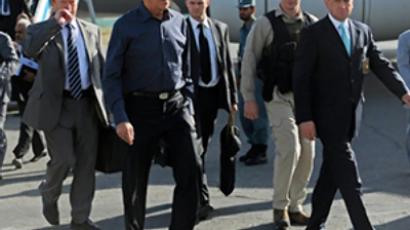Transitory friendships: US vulnerable over Afghan supply
NATO's recent deadly air attack on Pakistan has put the US mission in Afghanistan in danger with supplies cut-off, meaning Washington will soon have to turn to other transit states to keep its military effort going.
Russia is among the alternatives and this could mean some well-timed diplomatic leverage for Moscow.After the deadly friendly-fire attack last week that killed 24 Pakistani soldiers and injured many more, Washington has attempted to smother the scandal.“I would like to extend my most sincere condolences,” mumbled the US ambassador in Pakistan Cameron Munter.But for Pakistan, Washington’s condolences were not enough. Clearly, supplies are what keep a war running. So since Islamabad is fed up with the American war on the neighborly territory, it simply cut off one of the NATO’s major supply routes, thus putting all alliance’s operations in Afghanistan in danger.“The repeated incursions by the US military in Pakistan really left no choice – and also the humiliation that the Pakistani military faced in front of its own soldiers and the Pakistani people – left no choice before the government this time cut off the supply line,” argued Ahmed Quraishi, the president of PakNationalists Forum in Islamabad.With relations between the US and Pakistan as unstable as ever, in order to keep the war in Afghanistan running, NATO relies more on its other major supply route coming from the north. The northern supply network was started a few years ago, when Russia agreed to provide its territory and airspace for the transit of non-lethal supplies to NATO troops in Afghanistan. It proved to be a very reliable route, more reliable than Pakistan, now it accounts for half of NATO’s non-lethal supplies. On trucks, by railroad and air, supplies travel through Russian territory from Europe and from Russia’s Far East all the way to Afghanistan. And the reliance on this route is set to expand.In the last three years, Russia’s co-operation on Afghanistan has been key to NATO operations there. Speaking in a strictly personal capacity, Michael Vlahos, professor of strategy at the United States Naval War College, confessed to RT that “The US has a very tenuous kind of placement in Afghanistan and it is highly vulnerable – to the Pakistanis. But it is more vulnerable no to Russia. If Russia were to withdraw its permission for the US to use its rail lines we would be in a very difficult position in Afghanistan.”The Northern supply network could now be in danger because of a failure in diplomacy. Moscow says: because Washington turned down all of its proposals on the missile defense issue, Russia might have to resort to other arguments – including its co-operation with NATO on Afghanistan. “There are processes which are critically important for Russia – which are about Russia’s national security,” outlined Yury Krupnov, Institute for Demography, Migration and regulation Development. “One of them is NATO expansion to Russian borders and the fact that Washington goes ahead with a robust missile shield program in Europe without taking into consideration Russia’s concerns, gives Moscow the right to use any leverage it has to be heard by its partner.”But even the mere possibility that Russia could cut off the northern supply route, threatens the viability of all Western operations in Afghanistan. NATO risks leaving almost 140,000 of its troops in Afghanistan without vital supplies if diplomacy does not win the day. With Pakistan, it is about people there being fed up. With Russia it is about their national security. If Washington does not seriously address the concerns of its partners, even the best partnerships can fade.














